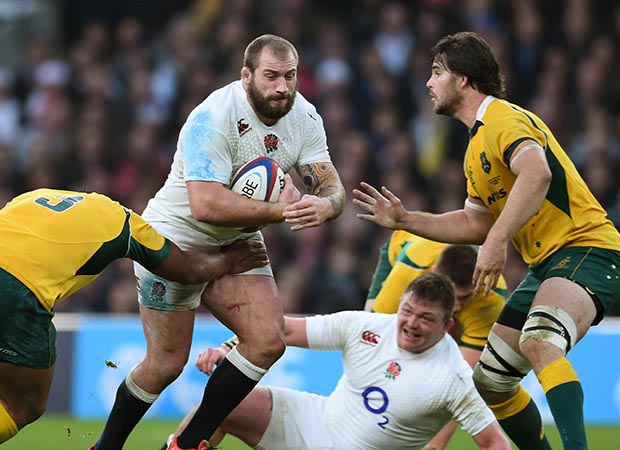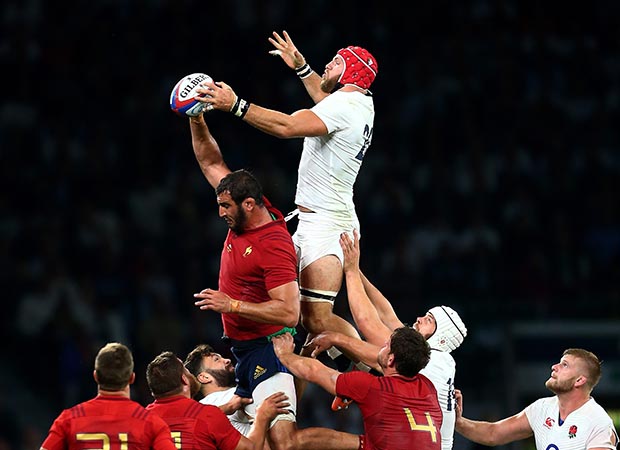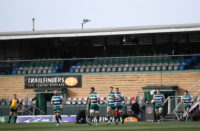 Forwards, and how many of them he needs, will be at the top of Stuart Lancaster's agenda as he contemplates cutting his England World Cup squad down to 31 this week. The head coach's calculations will be weighted by the realisation that his pack may not have fangs which can rip and tear as he thought, or have the strength-in-depth he once supposed.
Forwards, and how many of them he needs, will be at the top of Stuart Lancaster's agenda as he contemplates cutting his England World Cup squad down to 31 this week. The head coach's calculations will be weighted by the realisation that his pack may not have fangs which can rip and tear as he thought, or have the strength-in-depth he once supposed.
The message from England's Six Nations showdown against Ireland six months ago that their forwards are not world beaters was reinforced by the lacklustre display in the first warm-up game against France by Lancaster's reserve pack. Tom Wood's crew came second at the scrum and lineout in London, and with the French forwards not ranked currently among the World Cup's main movers and shakers, even a resounding response in Paris from the Red Rose first string pack would not provide conclusive proof of potency.
Only a settling of scores with the highly-rated Irish forwards a fortnight from now at Twickenham will restore their reputation. England were outplayed comprehensively by an Irish eight minus Jamie Heaslip, and yet there seems to be a sense of amnesia among some commentators as there is still talk of their forwards being world-class in almost every facet. It's almost as if the defeat by Ireland, and those by South Africa and New Zealand last autumn, have been parked out of sight, with the win over Australia still being viewed through rose-tinted lenses.
In the build up to the return Test against France the wishful thinking was still apparent when one English newspaper heralded the return to the starting line-up of Harlequins loosehead Joe Marler and Leicester tighthead Dan Cole by touting them as the two best props in their respective positions in the world.
There is no question that Marler and Cole have earned the respect of most of their opponents on the international circuit, but their track-records do not yet justify the title world's best.
In any realistic assessment of Test looseheads Marler rates behind Cian Healy (Ireland), Marcos Ayerza (Argentina), and also hugely experienced veterans such as South Africa's Tendai Mtawarira and New Zealand's Tony Woodcock. Meanwhile, Cole, along with every other international tighthead, is not in the same class as Owen Franks (New Zealand) in either the tight, or around the pitch. Nor would the Leicester No.3 eclipse the new French strong-man, Rabah Slimani, as a pure scrummager, or Australia's much-improved Sekope Kepu as a carrier. He would also find it hard going to shunt his way past two more Frenchmen, Nicolas Mas and the gargantuan Uini Atonio, in the pecking order.
The last time the English scrum made a significant noise was when the Aussies were pounded on their last visit to Twickenham, but since then there have been few signs of clear superiority. It may be time for England supporters to accept that it is unrealistic to expect the England scrum to steamroller all-comers.
However, an expectation which is not just realistic, but essential, is that England are powerful and cohesive on their own put-in.
That was not the case in the first French match, where a clear English scrum failing was exposed again. Despite Lancaster saying recently that he and forwards coach Graham Rowntree were focusing afresh on their hookers striking for the ball cleanly, Rob Webber was often unable to get the ball past the second-row in the face of French pressure.
 There is clearly urgent work still required by Rowntree to improve hooking timing and technique before the World Cup, because otherwise, against good scrummaging sides, England's put-in will be in jeopardy. It is not as if their coaches have not had plenty of time to find a remedy, because, with England's scrum being squeezed in their 2013 Grand Slam attempt in Cardiff, Tom Youngs' hooking difficulties were exposed.
There is clearly urgent work still required by Rowntree to improve hooking timing and technique before the World Cup, because otherwise, against good scrummaging sides, England's put-in will be in jeopardy. It is not as if their coaches have not had plenty of time to find a remedy, because, with England's scrum being squeezed in their 2013 Grand Slam attempt in Cardiff, Tom Youngs' hooking difficulties were exposed.
There were signs also in the first warm-up game that England's driving maul remains one of the longest works-in-progress in Test rugby. England lacked dynamism and guile in setting up the wedge on their own ball against the French, and they also defended poorly against the drive for Fulgence Ouedraogo's try. Even the driven catch that preceded Anthony Watson's first try failed to threaten the French line, with Ben Morgan forced in-field – but, thankfully, England were inventive enough to find a way of cracking the French defence by moving it wide.
The mechanism on which an effective lineout drive is built is one in which all the parts synchronise, but if the throw is not accurate then every cog fails to mesh. The disciplinary action against Dylan Hartley has removed certainty around the England throw because, after a great deal of hard work, it has become the Northampton No.2's strongest suit.
Rowntree has also had a stark reminder that irrespective of how good a young hooker like Luke Cowan-Dickie is in the loose, if his mastery of the set-piece basics like throwing are not of the same calibre, then he becomes a luxury that no World Cup contender can afford. With Tom Youngs and Webber both also prone to attacks of the throwing ‘yips', time is in short supply to see if Jamie George – who was on the bench in Paris – can transfer his precision for Saracens to international level.
If the England set-piece requires serious attention from Rowntree, so does the breakdown. However, despite the evidence of the Irish back-row dominating the tackle area in the 19-9 victory over England at Lansdowne Road, the forwards coach is sticking to his guns. Rowntree believes that England's collective strength at the breakdown is every bit as effective as the openside specialist route still favoured by the All Blacks, who have Richie McCaw and Sam Cane as turn-over scavengers, and the Wallabies, who boast Michael Hooper and David Pocock.
Rowntree commented recently: “Other teams put all their eggs in one basket. We have got threats across the board. Look at Dan Cole's post-tackle work, and Billy Vunipola, and Joe Launchbury, who headed the stats in the 2014 Six Nations. Billy (Vunipola) is developing in that, as well as our captain Chris Robshaw. I like to think we've got a spread of (turn-over) threats throughout the pack and indeed the XV – look at Mike Brown's work over the ball. We're not putting it all into one basket, saying to one guy, ‘this is your only job'. They've got to be multi-skilled.”
Rowntree's former Leicester Tigers and England team-mate Neil Back knows all about how to win ball at the breakdown as a No.7, and he voiced concerns this week that Robshaw is short of world class attributes and isn't among the world's top five opensides.
Back's verdict on the England captain? “He's improved over the ball, but if you're talking about the world's best players in that regard then he wouldn't be in the conversation.”
Robshaw is not alone. If the side he captains are to maximise on home advantage in this World Cup, then he is one of a number of England forwards who will have to force their way into that conversation before the end of October.



























